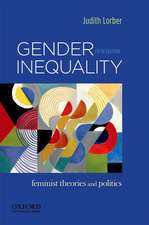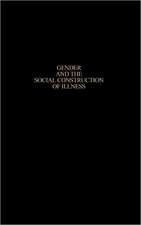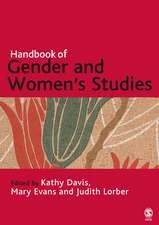Paradoxes of Gender
Autor Judith Lorberen Limba Engleză Paperback – 27 sep 1995
In this pathbreaking book, a well-known feminist and sociologist—who is also the Founding Editor of Gender & Society—challenges our most basic assumptions about gender. Judith Lorber views gender as wholly a product of socialization subject to human agency, organization, and interpretation. In her new paradigm, gender is an institution comparable to the economy, the family, and religion in its significance and consequences.
Drawing on many schools of feminist scholarship and on research from anthropology, history, sociology, social psychology, sociolinguistics, and cultural studies, Lorber explores different paradoxes of gender:
—why we speak of only two "opposite sexes" when there is such a variety of sexual behaviors and relationships;
—why transvestites, transsexuals, and hermaphrodites do not affect the conceptualization of two genders and two sexes in Western societies;
—why most of our cultural images of women are the way men see them and not the way women see themselves;
—why all women in modern society are expected to have children and be the primary caretaker;
—why domestic work is almost always the sole responsibility of wives, even when they earn more than half the family income;
—why there are so few women in positions of authority, when women can be found in substantial numbers in many occupations and professions;
—why women have not benefited from major social revolutions.
Lorber argues that the whole point of the gender system today is to maintain structured gender inequality—to produce a subordinate class (women) that can be exploited as workers, sexual partners, childbearers, and emotional nurturers. Calling into question the inevitability and necessity of gender, she envisions a society structured for equality, where no gender, racial ethnic, or social class group is allowed to monopolize economic, educational, and cultural resources or the positions of power.
Drawing on many schools of feminist scholarship and on research from anthropology, history, sociology, social psychology, sociolinguistics, and cultural studies, Lorber explores different paradoxes of gender:
—why we speak of only two "opposite sexes" when there is such a variety of sexual behaviors and relationships;
—why transvestites, transsexuals, and hermaphrodites do not affect the conceptualization of two genders and two sexes in Western societies;
—why most of our cultural images of women are the way men see them and not the way women see themselves;
—why all women in modern society are expected to have children and be the primary caretaker;
—why domestic work is almost always the sole responsibility of wives, even when they earn more than half the family income;
—why there are so few women in positions of authority, when women can be found in substantial numbers in many occupations and professions;
—why women have not benefited from major social revolutions.
Lorber argues that the whole point of the gender system today is to maintain structured gender inequality—to produce a subordinate class (women) that can be exploited as workers, sexual partners, childbearers, and emotional nurturers. Calling into question the inevitability and necessity of gender, she envisions a society structured for equality, where no gender, racial ethnic, or social class group is allowed to monopolize economic, educational, and cultural resources or the positions of power.
Preț: 343.45 lei
Nou
Puncte Express: 515
Preț estimativ în valută:
65.72€ • 68.85$ • 54.47£
65.72€ • 68.85$ • 54.47£
Carte în stoc
Livrare din stoc 26 februarie
Preluare comenzi: 021 569.72.76
Specificații
ISBN-13: 9780300064971
ISBN-10: 0300064977
Pagini: 435
Ilustrații: black & white illustrations
Dimensiuni: 156 x 235 x 29 mm
Greutate: 0.67 kg
Ediția:Revised
Editura: Yale University Press
Colecția Yale University Press
ISBN-10: 0300064977
Pagini: 435
Ilustrații: black & white illustrations
Dimensiuni: 156 x 235 x 29 mm
Greutate: 0.67 kg
Ediția:Revised
Editura: Yale University Press
Colecția Yale University Press
Recenzii
"A brilliant, compelling, and timely analysis of gender from a critical feminist perspective."—Patricia Yancey Martin, The Ohio State University
"An extraordinary book that will become a classic. It is impossible to read this book and not rethink gender."—Barbara Katz Rothman, Baruch College
"With remarkable intellectual breadth, Judith Lorber probes a series of paradoxes to theorize about gender as an all-encompassing social institution. This inclusive and compelling book will transform our thinking about society as well as women and men."—Maxine Baca Zinn, Michigan State University
"That gender is one of the central axes around which social life revolves (like race or class) has become a social science truism. But Judith Lorber goes further in this deeply thoughtful work. Lorber claims gender is a central social institution, analogous to the state or the market. Wide-ranging, provocative, and eloquently argued, Paradoxes of Gender is one of those rare works that define a field."—Michael Kimmel, Associate Professor, SUNY at Stony Brook
"An extraordinary book that will become a classic. It is impossible to read this book and not rethink gender."—Barbara Katz Rothman, Baruch College
"With remarkable intellectual breadth, Judith Lorber probes a series of paradoxes to theorize about gender as an all-encompassing social institution. This inclusive and compelling book will transform our thinking about society as well as women and men."—Maxine Baca Zinn, Michigan State University
"That gender is one of the central axes around which social life revolves (like race or class) has become a social science truism. But Judith Lorber goes further in this deeply thoughtful work. Lorber claims gender is a central social institution, analogous to the state or the market. Wide-ranging, provocative, and eloquently argued, Paradoxes of Gender is one of those rare works that define a field."—Michael Kimmel, Associate Professor, SUNY at Stony Brook
Notă biografică
Judith Lorber is professor of sociology at Brooklyn College and the Graduate School, City University of New York.
























